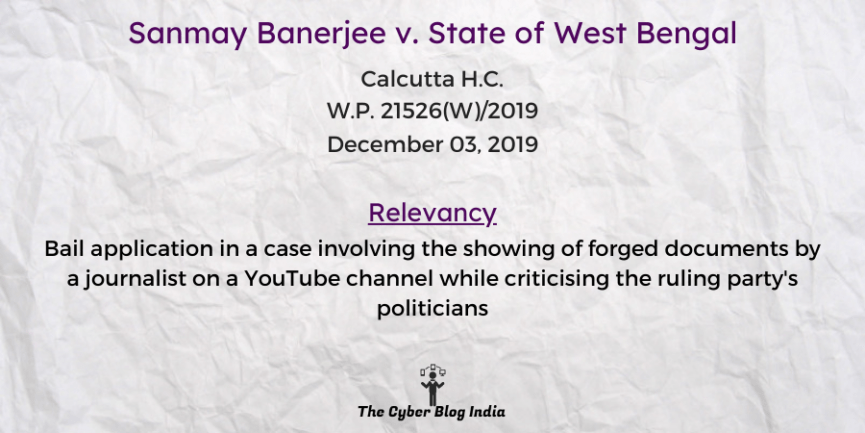Sanmay Banerjee v. State of West Bengal

Sanmay Banerjee v. State of West Bengal
In the High Court of Calcutta
W.P. 21526(W)/2019
Before Justice Sabyasachi Bhattacharya
Decided on December 03, 2019
Relevancy of the case: Bail application in a case involving the showing of forged documents by a journalist on a YouTube channel while criticising the ruling party’s politicians
Statutes and Provisions Involved
- The Information Technology Act, 2000 (Section 43, 66)
- The Indian Penal Code, 1860 (Section 465, 469, 500, 504, 505(1)(b))
- The Code of Criminal Procedure, 1973 (Section 41A)
- The Constitution of India, 1950 (Article 19(1)(a))
Relevant Facts of the Case
- The petitioner claims he is a freelance journalist, and his work has exposed corruption.
- The police picked up the petitioner without any prior notice. In the custody, the police tortured him and forced him to admit to falsified documents.
- He has filed this petition for quashing the FIR and relevant criminal proceedings.
Prominent Arguments by the Advocates
- The petitioner’s counsel argued that the police had to issue a notice within 2 weeks, as per Section 41A, for him to appear. The complainant is an assistant public prosecutor with no locus standi to file the complaint. The police initiated these proceedings merely because the petitioner criticised the Chief Minister and other ruling party politicians. Lastly, these actions have violated the petitioner’s fundamental right to free speech and expression.
Opinion of the Bench
- The complainant had no connection with the alleged offences, and the police could not commence an investigation on its own for the given allegations. The petitioner did not know that the documents on his YouTube channels were forged.
- As for defamation, the defamed persons have not come up or filed a complaint.
- Section 43 of the Information Technology Act, 2000 has no connection with the allegations. Therefore, Section 66 is not applicable.
- People can criticise the government as part of their fundamental rights. It is not shown how criticism of the government can cause fear or alarm to the public.
- The actions of the police reeked of political motivation rather than legal motivation. The findings are tentative and made only for the interim prayer.
Final Decision
- The court granted interim relief and restrained the authorities from taking coercive action against the petitioner.
Loreal Sahay, an undergraduate student at the University School of Law and Legal Studies, GGSIPU, prepared this case summary during her internship with The Cyber Blog India in January/February 2021.
